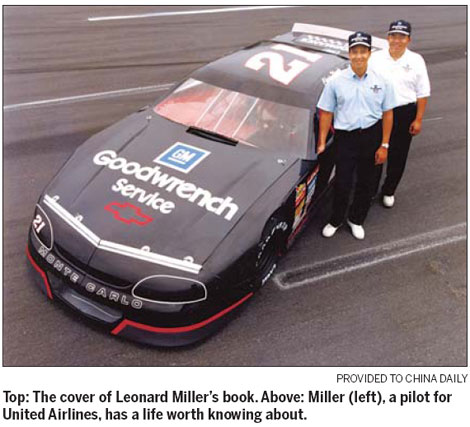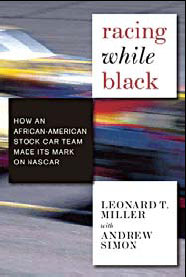A NASCAR experience that upset many Southern folk
By Lara Farrar (China Daily)
Updated: 2010-06-02 10:16
 |
Large Medium Small |

Rarely do we know about the lives of the pilots who fly us around the world. Our brief interactions with them consist of listening to in-flight announcements they make thousands of feet above the earth, or saying goodbye to them as we disembark from airplanes.
Leonard Miller, a pilot for United Airlines, has a life worth knowing about.
Miller is the author of Racing While Black, a book chronicling his experience owning the first, and so far only, NASCAR team run by African Americans.
Miller frequently flies to Beijing from his base in Washington DC. On layovers, he visits friends he has made over the years he's traveled to the capital.
While expensive cars and the exclusive Formula 1 races have made it to China, NASCAR has yet to make any major inroads - yet.
In 2007, NASCAR executives visited Beijing to meet government officials, industry and marketing officials, and potential broadcast partners to educate "Chinese companies about the brand-building power" of NASCAR in the United States, its website said. There were also talks about broadcasting NASCAR on Chinese television.
During Miller's most recent trip on the heels of this year's Beijing auto show, he stopped by the Bookworm store to talk about the challenges he faced in the largely white and southern world of NASCAR
"We came out of nowhere," Miller said. "And it looked like we were taking away their thunder and their sport.

"Everywhere we went, they viewed it as, 'Here we go again, if we let African Americans get involved in this, the sport will get away from us, like what happened with golf and tennis.' It upset a lot of people."
For those unfamiliar with NASCAR, there are a couple of key points to understand about the sport. Unlike the more elitist Formula 1 racing, NASCAR appeals to a blue-collar set of fans located mostly in the American South.
During the past couple of decades, it has become the No 1 spectator sport in the US, with a following of about 75 million, the US Census Bureau says.
NASCAR's immense popularity is why Miller decided to take part in it. From New Jersey, Miller grew up around fast cars. His father, Leonard W. Miller, was a pioneering drag racer and part of the first black-owned team to enter in the Indianapolis 500 in 1972.
In 1990, Miller and his father decided to start a racing team of their own. The two, Miller said, wanted to go for Formula 1 or the Indy Racing League but were pushed to NASCAR by sponsors who saw more of a business opportunity there.
"We were pulled into it by default," Miller said. "Because the industry of NASCAR was getting so big and popular, the corporations only wanted to go that way because it made more sense from a business standpoint."
From day one, Miller and his father faced obstacles fueled by the subtle undercurrents of racism that still persist in many areas in the South.
Gaining sponsorship was difficult, if not almost impossible.
Companies either blatantly did not want to be affiliated with an African American racing team or would tell Miller that he needed to seek money from corporations' so-called "diversity programs" - divisions established aimed at showcasing a company's dedication to providing equal opportunities to minorities.
One company told Miller: "We are not prejudiced. We donated money to the Martin Luther King Jr Memorial in Washington DC."
"That is what we would face over and over again," Miller said.
On the racetrack, discrimination was even more blatant. When the Miller Racing Group won a grassroots NASCAR race in 2001 at a speedway in North Carolina, fans taunted them, photographers refused to take their picture in the winner's circle, and the trophy queen "took off", refusing to give the winning driver the traditional congratulatory kiss, Miller said.
"We constantly faced hostility," Miller said. "We were even in fights at the racetrack."
After nearly two decades, Miller and his father decided to exit NASCAR in 2007. Their equipment was aging and they had sunk hundreds of thousands of dollars into the team.
Miller says there was never a feeling of defeat. Rather a constant hope that he and his father's efforts, at the very least, would someday make it easier for future black racing teams to further narrow the racial divide not only in NASCAR but also in America.
"We always felt we could see light at the end of the tunnel," Miller said. "Even when the doors were shut in our face, we could still see the possibility to make it to the top. That is what kept us going."
Miller flies to Beijing every couple of months or so. He will next be landing here sometime in June or July. On any future flights you may have to Beijing from the US or the other way around, be sure to check if he is your pilot.
?